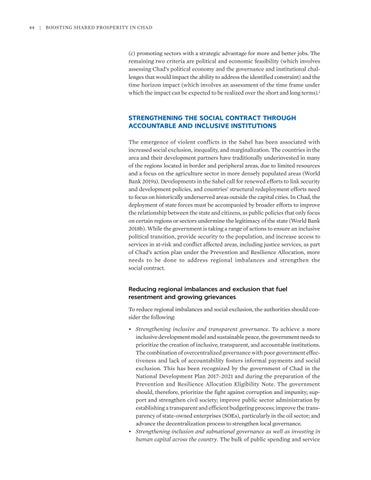44
|
BOOSTING SHARED PROSPERITY IN CHAD
(c) promoting sectors with a strategic advantage for more and better jobs. The remaining two criteria are political and economic feasibility (which involves assessing Chad’s political economy and the governance and institutional challenges that would impact the ability to address the identified constraint) and the time horizon impact (which involves an assessment of the time frame under which the impact can be expected to be realized over the short and long terms).1
STRENGTHENING THE SOCIAL CONTRACT THROUGH ACCOUNTABLE AND INCLUSIVE INSTITUTIONS The emergence of violent conflicts in the Sahel has been associated with increased social exclusion, inequality, and marginalization. The countries in the area and their development partners have traditionally underinvested in many of the regions located in border and peripheral areas, due to limited resources and a focus on the agriculture sector in more densely populated areas (World Bank 2019a). Developments in the Sahel call for renewed efforts to link security and development policies, and countries’ structural redeployment efforts need to focus on historically underserved areas outside the capital cities. In Chad, the deployment of state forces must be accompanied by broader efforts to improve the relationship between the state and citizens, as public policies that only focus on certain regions or sectors undermine the legitimacy of the state (World Bank 2018b). While the government is taking a range of actions to ensure an inclusive political transition, provide security to the population, and increase access to services in at-risk and conflict affected areas, including justice services, as part of Chad’s action plan under the Prevention and Resilience Allocation, more needs to be done to address regional imbalances and strengthen the social contract.
Reducing regional imbalances and exclusion that fuel resentment and growing grievances To reduce regional imbalances and social exclusion, the authorities should consider the following: • Strengthening inclusive and transparent governance. To achieve a more inclusive development model and sustainable peace, the government needs to prioritize the creation of inclusive, transparent, and accountable institutions. The combination of overcentralized governance with poor government effectiveness and lack of accountability fosters informal payments and social exclusion. This has been recognized by the government of Chad in the National Development Plan 2017–2021 and during the preparation of the Prevention and Resilience Allocation Eligibility Note. The government should, therefore, prioritize the fight against corruption and impunity; support and strengthen civil society; improve public sector administration by establishing a transparent and efficient budgeting process; improve the transparency of state-owned enterprises (SOEs), particularly in the oil sector; and advance the decentralization process to strengthen local governance. • Strengthening inclusion and subnational governance as well as investing in human capital across the country. The bulk of public spending and service
